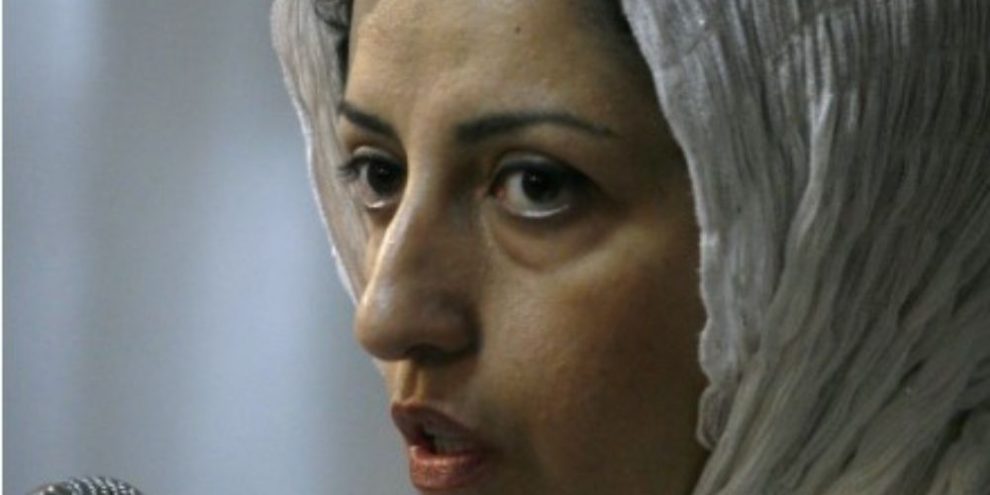
By Jon Gambrell And Mike Corder in Oslo
Imprisoned Iranian activist Narges Mohammadi won the Nobel Peace Prize on Friday in recognition of her tireless campaigning for women’s rights and democracy and against the death penalty.
Mohammadi, 51, has kept up her activism despite numerous arrests by Iranian authorities and spending years behind bars. She has remained a leading light for nationwide, women-led protests, sparked by the death last year of a 22-year-old woman in police custody. Those demonstrations grew into one of the most intense challenges ever to Iran’s theocratic government.
“This prize is first and foremost a recognition of the very important work of a whole movement in Iran with its undisputed leader, Narges Mohammadi," said Berit Reiss-Andersen, the chair of the Norwegian Nobel Committee. She began the announcement with the words “Woman, Life, Freedom” in Farsi — the slogan of the demonstrations in Iran.
Reiss-Andersen said the committee hopes the prize "is an encouragement to continue the work in whichever form this movement finds to be fitting.” She also urged Iran to release Mohammadi in time for the prize ceremony on Dec. 10.
For nearly all of Mohammadi’s life, Iran has been governed by a Shiite theocracy headed by the country’s supreme leader. While women hold jobs, academic positions and even government appointments, their lives can be tightly controlled. Laws require all women to at least wear a headscarf, or hijab, to cover their hair as a sign of piety. Iran and neighboring Afghanistan remain the only countries that mandate it.
In a statement released to The New York Times after the Nobel announcement, Mohammadi said she will "never stop striving for the realization of democracy, freedom and equality.”
“Surely, the Nobel Peace Prize will make me more resilient, determined, hopeful and enthusiastic on this path, and it will accelerate my pace," she said.
Mohammadi, an engineer by training, has been imprisoned 13 times and convicted five times, according to Reiss-Andersen. In total, she has been sentenced to 31 years in prison. Her most recent incarceration began when she was detained in 2021 after attending a memorial for a person killed in nationwide protests sparked by an increase in gasoline prices.
She has been held at Tehran’s notorious Evin Prison, whose inmates include those with Western ties and political prisoners.
Her brother, Hamidreza Mohammadi, told The Associated Press by telephone from Norway where he lives that he has not been able to speak with his sister but that the prize “means a lot to her.”
Despite that and the fact that “the prize means that the world has seen this movement,” the award will not affect the situation in Iran, he said.
“The regime will double down on the opposition, and it will have no effect on the regime,” he said. “They will just crush people.”
Waiting for the announcement “was nerve-wracking,” he said. But he knew immediately that his sister had won when he heard Reiss-Andersen saying “woman, life, freedom” in Farsi.
Her husband Taghi Rahmani, who now lives in exile in Paris with their two children, 16-year-old twins, said that although he hadn't been able to reach her since the announcement, she "would be very glad to know she has won an award and she will re-state her determination like always.”
“She has a sentence she always repeats: ‘Every single award will make me more intrepid, more resilient and more brave for realizing human rights, freedom, civil equality and democracy,'” he said.
Rahmani hasn't been able to see his wife for 11 years, and their children haven΄t seen their mother for seven, he said.
Their son, Ali Rahmani, said the prize was not just for his mother. “It's for the struggle.΅
“Iranian men and women have been fighting for over a year. This prize is for the entire population, for the whole struggle from the beginning, since the Islamic government came to power," Ali Rahmani said.
Narges Mohammadi is the 19th woman to win the Nobel Peace Prize and the second Iranian woman, after human rights activist Shirin Ebadi won the award in 2003.
It’s the fifth time in the 122-year history of the awards that the peace prize has been given to someone who is in prison or under house arrest. Last year, the top human rights advocate in Belarus, Ales Bialiatski, was among the winners. He remains imprisoned.
Mohammadi was in detention for the recent protests of the death of Mahsa Amini, who had been picked up by the morality police for her allegedly loose headscarf. More than 500 people were killed in a heavy security crackdown while over 22,000 others were arrested.
But from behind bars, Mohammadi contributed an opinion piece for The New York Times last month.
“What the government may not understand is that the more of us they lock up, the stronger we become,” she wrote.
In a first reaction from Tehran, the semi-official Fars news agency dismissed Mohammadi as someone who “persisted in creating tension and unrest and falsely claimed that she was beaten in prison.”
Fars is believed to be close to Iran’s hard-line paramilitary Revolutionary Guard, which answers only to Supreme Leader Ayatollah Ali Khamenei.
Abuse in Iranian prisons — something Mohammadi has campaigned against both outside of and behind bars — has been widely reported by the U.N. and human rights groups.
Before being jailed, Mohammadi was vice president of the banned Defenders of Human Rights Center in Iran. Nobel laureate Ebadi, who Mohammadi is close to, founded the center.
In 2018, Mohammadi was awarded the Andrei Sakharov Prize.
The Nobel Prizes carry a cash award of 11 million Swedish kronor (about $1 million). Winners also receive an 18-carat gold medal and diploma at the award ceremonies in December.
Unlike the other Nobel prizes that are selected and announced in Stockholm, founder Alfred Nobel decreed that the peace prize be decided and awarded in Oslo by the five-member Norwegian Nobel Committee. The independent panel is appointed by the Norwegian parliament.
The Nobel season ends Monday with the announcement of the winner of the economics prize, formally known as the Bank of Sweden Prize in Economic Sciences in Memory of Alfred Nobel.
___
Gambrell reported from Dubai, United Arab Emirates, and Corder from The Hague, Netherlands. John Leicester and Nicolas Garriga in Paris, Elena Becatoros in Athens, Greece, and Jan M. Olsen in Copenhagen, Denmark, contributed.





